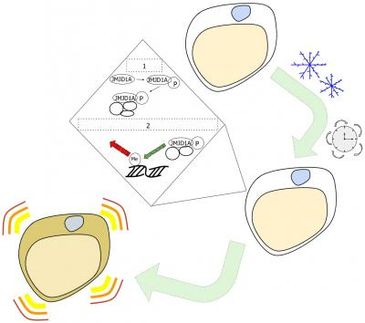NIH scientists identify maternal and fetal genes that increase preterm birth risk
Findings support view of preterm labor as immune response to infection or injury
Researchers at the National Institutes of Health have identified DNA variants in mothers and fetuses that appear to increase the risk for preterm labor and delivery. The DNA variants were in genes involved in the regulation of inflammation and of the extracellular matrix, the mesh-like material that holds cells within tissues.
"A substantial body of scientific evidence indicates that inflammatory hormones may play a significant role in the labor process," said Alan E. Guttmacher, M.D., acting director of the NIH's Eunice Kennedy Shriver National Institute of Child Health and Human Development (NICHD). "The current findings add evidence that individual genetic variation in that response may account for why preterm labor occurs in some pregnancies and not in others."
Like sensitivity to allergens such as house dust or pollen, the severity of the immune response appears to vary from individual to individual, accounting for why some pregnancies end in early labor and delivery. The findings may one day lead to new strategies to identify those at risk for preterm birth, and to ways to reduce the occurrence of preterm birth among those at risk.
The findings were presented at the 30th Annual Society for Maternal-Fetal Medicine meeting by Dr. Roberto Romero, M.D, chief of the perinatology research branch and program head for perinatal research and obstetrics at the NICHD. At the meeting, Dr. Romero and his team received the March of Dimes Excellence Award for innovative research on preterm birth for this study.
Organizations
Other news from the department science

Get the life science industry in your inbox
By submitting this form you agree that LUMITOS AG will send you the newsletter(s) selected above by email. Your data will not be passed on to third parties. Your data will be stored and processed in accordance with our data protection regulations. LUMITOS may contact you by email for the purpose of advertising or market and opinion surveys. You can revoke your consent at any time without giving reasons to LUMITOS AG, Ernst-Augustin-Str. 2, 12489 Berlin, Germany or by e-mail at revoke@lumitos.com with effect for the future. In addition, each email contains a link to unsubscribe from the corresponding newsletter.



















































